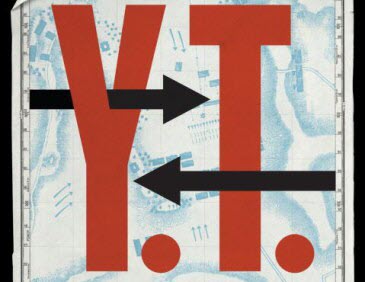“Play is older than culture, for culture, however inadequately defined, always presupposes human society, and animals have not waited for man to teach them playing.” This is how the Dutch historian Johan Huizinga begins Homo Ludens: A Study of the Play Element in Culture. Written in 1938, just prior to the Second World War, the book might have been wholly contretemps if the author hadn’t deftly considered how combat and politics are each shot through with elements of play and gamesmanship. Who are generals and politicians if not, at least in part, overgrown boys wagering the fate of nations? The stakes were outrageous and the rules inhumane, but then, as Huizinga put it, play doesn’t need humans, enlightened humans least of all.
The cruel aspects of play are made apparent in Y.T. a recent novel by the Ukrainian Alexi Nikitin, translated by Anne Marie Jackson and published this April by Melville House. The title is an initialism, shorthand for “your turn” a term used in a strategy game developed by bored students assigned to agricultural duty in the Ukrainian countryside. The action begins in 1984. Associations with George Orwell aside, the date is an unlucky one for the narrator Alexander Davidov and his four companions. The decrepitude of the Soviet system has become all too apparent for those living within it, but the reforms of Perestroika have yet to come. The students have gone to university to study radiophysics, but this is immaterial to their job helping peasants grow apples. As city kids, the students are wholly unsuited to the task. There is nothing to be done except play cards and dine on country cooking. Better entertainment is needed. Using algorithms learned in their university studies, they partition the Soviet Union into a set of fictional entities that vie with each other for military, economic, and political supremacy.
Immersive as it is, the game seems safely disconnected from reality. Slovenorussia, The United Islamic Caliphates, the Khanate of Zaporozhye, and a retained Holy Roman Empire, these fictional entities contend with each other ruthlessly, but the winners and losers are winners and losers on paper. What the students don’t realize is that within a corrupt system, fantasy and reality can trade places in an instant. Their trouble begins back at university in Kiev. One of the fictional documents is stolen by a known KGB informant. The boys are arrested on the suspicion that they are planning the breakup of the Soviet Union. It’s a completely pointless exercise. The captors, bored of their assignment, scrupulously learn the rules of the game, not because they contain sensitive geopolitical information, but because they want to play along as well.
The action picks up twenty years later. Davidov receives an email with an ultimatum directed at Slovenorussia. The Khanate of Zaporozhye demands that they cease fomenting revolutionary actions in the Holy Roman Empire. The communique ends with “Y.T.” signifying that Slovenorussia must respond or face invasion. Twenty years prior, the country was played by Davidov’s friend Kurochkin. Now actual politics have replaced their fictional analogues, but with the same sense of unreality. Kurochkin is a member of the Ukrainian Parliament and former First Deputy Premier, a pretentious title for a pretentious man. His corrupt dealings with foreign business interests are an open secret. The email coincides with 90 million US dollars going missing from the government’s coffers. Who could have done this? The gang have all met various fates. One died in the War of Afghanistan. Another has been ruined by bad investments. Someone else has been dealt in, and is playing for different stakes.
At the heart of Y.T. is an obvious but nonetheless suitable message. The citizens of the former Soviet Union have been hustled. The good life under democracy and capitalism, the “winning conditions” of the game, did not materialize, at least not in the way most had hoped for. War, corruption, and exploitation continue. The novel is at its best when these elements are concretized in descriptions of Kiev and the people living there. The sordidness evoked by the ruined bars and empty backstreets would not be out of place in a Graham Green novel.
Sometimes the allegory is a bit too much. Late in the book, a wounded Chechen guerilla makes an appearance, just so you know we’re dealing with the tragedy of post-Soviet life. The passages about the game itself tend to be underwhelming and are abandoned early on, a curious choice since the game is the hinge on which all the action turns. Descriptions of it resemble the ultraspecific yet somehow vague language used by gamers in digital forums. The discourse tends towards insidery jargon. But in a novel written for public consumption, this needn’t be so.
When analyzing how games and reality interact, science fiction has been, perhaps not surprisingly, at the vanguard for many years. The Player of Games, the 1988 space opera novel by Iain M. Banks, explores politics using richly described fictional board games. On the popular end of the literary spectrum, Ready Player One by Ernest Cline turns rehashed 80s culture into the premise of a massive multiplayer online roleplaying game. Reading about games, it turns out, doesn’t have to be as boring as watching other people play them.
Nevertheless, Nikitin is an incisive social critic. As with good political fiction in general, the issues are not just parochial . The feeling that one is wagering against a set of loaded die, the feeling of being cheated in other words, goes beyond the rather specific geography, real or otherwise, that Nikitin evokes. The novel stands as an indictment against corruption and false promises, wherever they occur. Taken on its own, Y.T. is at its best when critiquing the unjust rules still at play in our contemporary world.
*****
Read more from Ukraine:

